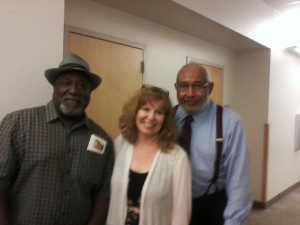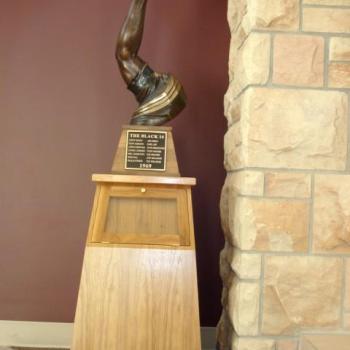
Mel Hamilton is one of my heroes. He spoke on July 13th about his experience as one of the Black Fourteen at Wyoming University in 1969. He and thirteen other black players on the team—the best Wyoming had ever had and perhaps the best they will have—wanted to protest the Mormon priesthood restriction when they played BYU. They wanted to play the game, but wearing black armbands. Their coach, Lloyd Eaton, asked them to sit in the fieldhouse bleachers.
As Clifford A. Bullock describes it:
In the presence of two assistant coaches, Eaton called the Blacks “rabble-rousers” who could no longer be supported by taxpayer money. He told them they could go back on “Negro relief.” Repeatedly he told the athletes to “shut up” and suggested that if they had not come to Wyoming, “they would be out on the streets hustling.” Eaton then revoked their scholarships and dismissed them from the team.
The protest was heard around the nation, and WAC (Western Athletic Conference) teams soon showed their support for the fired athletes by wearing black armbands.
Hamilton, from North Carolina, had already learned about racism in Laramie. He noticed that people would avoid him. One woman in particular would always cross the street when she saw him coming. Finally, he followed her and asked if she was avoiding him on purpose. She admitted that she had never seen a black person and was uncomfortable. Eventually, they became friends, and remain so today.
As I listened to Mel Hamilton talk about the lessons he learned in his youth at Boys’ Town—to discover who you are and what you believe and then to stand up for it—the verdict acquitting George Zimmerman was being read on television. Zimmerman had “stood his ground” and, despite instructions to not pursue the unarmed Trayvon Martin, had shot and killed him. What was his moral ground? The black armbands which the Fourteen wore were a statement advocating civil rights. Zimmerman acted alone, against instruction, and violently.
Mel Hamilton suggested that if we were uncomfortable with someone for whatever reason—even something as trivial as hair color (yes, some are prejudiced against redheads)—we should invite them over for dinner. As we break bread together, we are equals, and we get to know one another.
Years ago, I was lost in Guatemala City. I can get lost rather easily. This time, I wanted to get to the place where my dad was: Val Paraiso. I knew it was fairly close to Coban, but I had no plans about what I would do after I arrived in Coban. I was a stranger in a strange land.
A Guatemalan woman got on the bus, putting her packages on the shelf across from me. Then she looked at me several times. I gave an awkward smile, fully aware that I looked out of place. She finally brought her things to the seat in front of mine. and sat down.
The bus began its journey.
I was utterly foreign in Guatemala City—a red headed Mormon in a Catholic country where nobody had hair like mine. The woman turned to me and we began conversing. She asked where I was from. I told her, “Utah.” Amazingly, she knew that Utah was the Mormon state. “Eres Mormona?” she asked me. I told her I was indeed a Mormon. “Ahh,” she breathed. “So am I. I knew that I was supposed to sit by you. I wasn’t going to, but something prodded me. So, you’re going to Coban?” I told her I was going to a place near Coban, called Val Paraiso. She shook her head. “Oh no,” she said. “Val Paraiso is a long ways from Coban. You will stay with me tonight. My son works at Val Paraiso. He’ll take you there tomorrow.”
Yes, a little miracle. She gave me a bowl of delicious black beans and several tortillas, and we talked easily over that simple dinner. She was my guardian angel. She might have thought I was foolish for going somewhere without a plan, but she took care of me anyway. I arrived safely in Val Paraiso the next day.
What might have happened had she not shared her meal with me in a safe place? That’s impossible to know. I would have been on the streets, or sleeping under a tree.
What might have happened if Coach Eaton had paid attention to the Fourteen and exercised some empathy? He might not have died a recluse in Idaho. He might have been known as the coach who won the Super Bowl rather than the coach who shut down a non-violent civil rights protest.
And George Zimmerman? Why was he even carrying a gun? Racial profiling took a deadly toll which will go down in history as another case where an innocent black kid (and it doesn’t matter what mischief he might have done before his murder) was gunned down by someone who could see only the threat. His parents will grieve for the rest of their lives.
My own son will leave home in ten days to live with my daughter and start his independence. I will take over his bedroom. I am going to make it into a dining room. You are invited in for a meal, if you’d care to visit. I’m sure we can all get along.












